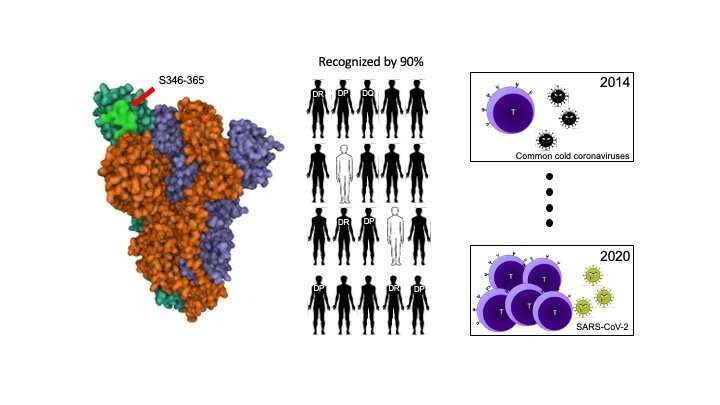How CD4+ T cells respond to SARS-CoV-2 in COVID-19 recovered patients

An international team of researchers from the Institute for Research in Biomedicine, affiliated to the Università della Svizzera italiana, has deciphered the T cell responses occurring during COVID-19 infection at single-cell resolution. This study, which was performed at the Center of Medical Immunology under the leadership of Prof. Federica Sallusto, included collaborations with clinical institutions from Ticino and Italy: Ente Ospedaliero Cantonale (EOC), the Clinica Luganese Moncucco, the Policlinico S. Matteo in Pavia, and INGM Milano, is published in the current issue of Science.
T lymphocytes are a subset of immune cells in the blood that mount a protective immune response against foreign pathogens such as SARS-CoV-2. These T lymphocytes can directly neutralize the threat and/or indirectly help by promoting antibody production. "A precise understanding of how T cells respond to SARS-CoV-2 infection could help inform the design of next generation vaccines to coronaviruses," says Prof. Federica Sallusto.
The SARS-CoV-2 virus is composed of several proteins, including the Spike glycoprotein, which contains a domain that latches onto host cells for infection, called the receptor-binding-domain (RBD). "We wanted to understand which SARS-CoV-2 proteins are highly targeted by CD4+ T cells, a T cell type that helps the immune response to fight against infectious pathogens," says Dr. Federico Mele, a main author of this study. By profiling almost 3000 CD4+ T cells isolated from 34 SARS-CoV-2-exposed donors, the team found that the RBD is highly targeted. "Strikingly, a 20-amino-acid stretch of the RBD is recognized by almost all donors. The discovery of this immunodominant region highlights a shared molecular basis of immune recognition in all individuals exposed to SARS-CoV-2 infection or vaccination," says Daniela Vaqueirinho, a USI doctoral student and another main author of the study.
Each T cell harbors a T cell receptor (TCR) on the surface, which they use to recognize the pathogens. By sequencing the TCR of SARS-CoV-2-specific T cells from COVID-19-recovered donors, the authors found that COVID-19 infection generates diverse subsets of CD4+ T cells with distinct functional properties important for immune protection. "It's a relief that these diverse SARS-CoV-2-specific T cells can be detected up to 12 months post-infection. The longevity of these cells is pivotal for a long-lived protective immunity," says Dr. Jun Siong Low, another main author of the study.
Some strains of coronaviruses are endemic and circulate within the human population, such as those causing the common cold. To understand whether pre-existing immunity to these common cold coronaviruses can contribute to COVID-19 immune response, the team studied in-depth a single donor from whom they had collected blood samples before and after COVID-19. They were able to show that some of the SARS-CoV-2-reactive T cells were already present many years before SARS-CoV-2 outbreak, and that some of these cells were also able to recognize all common cold coronaviruses. "Altogether, our findings show that prior infections with common-cold coronaviruses can generate T cells that can be recruited again in the immune response to SARS-CoV-2," says Dr. Antonino Cassotta, a senior author of the study.
More information: Jun Siong Low et al, Clonal analysis of immunodominance and cross-reactivity of the CD4 T cell response to SARS-CoV-2, Science (2021). DOI: 10.1126/science.abg8985




















